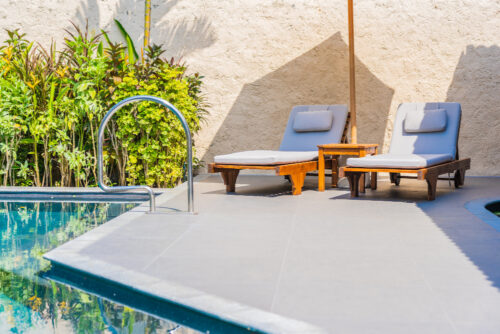Should you seal porcelain patio tiles?
One question that’s sure to arise early in the installation process is: Should you seal porcelain patio tiles?
Among the things you must love about porcelain tiles is their stylish appearance, hence why there’s anxiety around how long those good looks will last.
While becoming the go-to choice for anyone who wants fabulous paving that requires only minimum maintenance, it remains a relatively new product the market.
As a result, there is uncertainty about the claims surrounding them.
One question that’s sure to arise early in the installation process is: Should you seal porcelain patio tiles?
After all, similar natural stone pavers require a sealant to ensure they don’t become stained through constant use.
So, if you are wondering ‘should you seal porcelain patio tiles?’ we can help.
Should you seal porcelain patio tiles?
You may have read that porcelain paving has a low porosity.
What this means is that it doesn’t absorb moisture like other kinds of paving materials. The reason for this is that it’s fired in a kiln at searingly high temperatures that cause it to vitrify. This results in it being credibly dense and tough.
And, more to the point, the process gives it an incredibly low porosity rating of under 0.5 per cent.
Basically, there is hardly anywhere for moisture to seep in and that’s excellent news. It ensures there is no surface water, making it less slippery than other materials. Moss and algae can’t stick to the surface either.
What it also means is your porcelain pavers do not require sealing – a major plus point for anyone who is looking for a paver that requires a minimum of post-installation maintenance.
But are there occasions when you should seal porcelain patio tiles you might wonder?
Honestly, it really is not an essential part of your porcelain paving maintenance. However, you may want to consider a sealant if you want to make extra sure your porcelain pavers are kept in tip top quality.
If you are living surrounded by trees, where there is a high risk of getting wood and leaf tannin staining, then you may want the extra assurance of a sealant as this kind of staining can require a bit of elbow grease to clean.
Of course, you could just as easily invest in a specialist cleaner to fix the problem.
And that’s it! We can’t recommend porcelain enough for your project if you want outdoor paving that is hard wearing, low maintenance and gorgeous to look at.
Oh, and doesn’t need sealing!
Want to know more?
We hope that this guide has answered any questions you may have had about how to lay porcelain paving and provided you with a good starting point for your next DIY paving project.
If you are interested in exploring our stunning collection of porcelain paving tiles, please visit our website, where we're sure you'll find the perfect fit!
For more information about laying porcelain paving slabs or if you have any other questions, don't hesitate to get in touch with the tea at Forward Builders' Supplies team by dialling 0151 35 1035, or you can send us a message using our Instant Chat feature located in the bottom right-hand corner of our website home page.

 Log Out
Log Out 









The information below is required for social login
Login
Register
Fill in the form below to create your new account